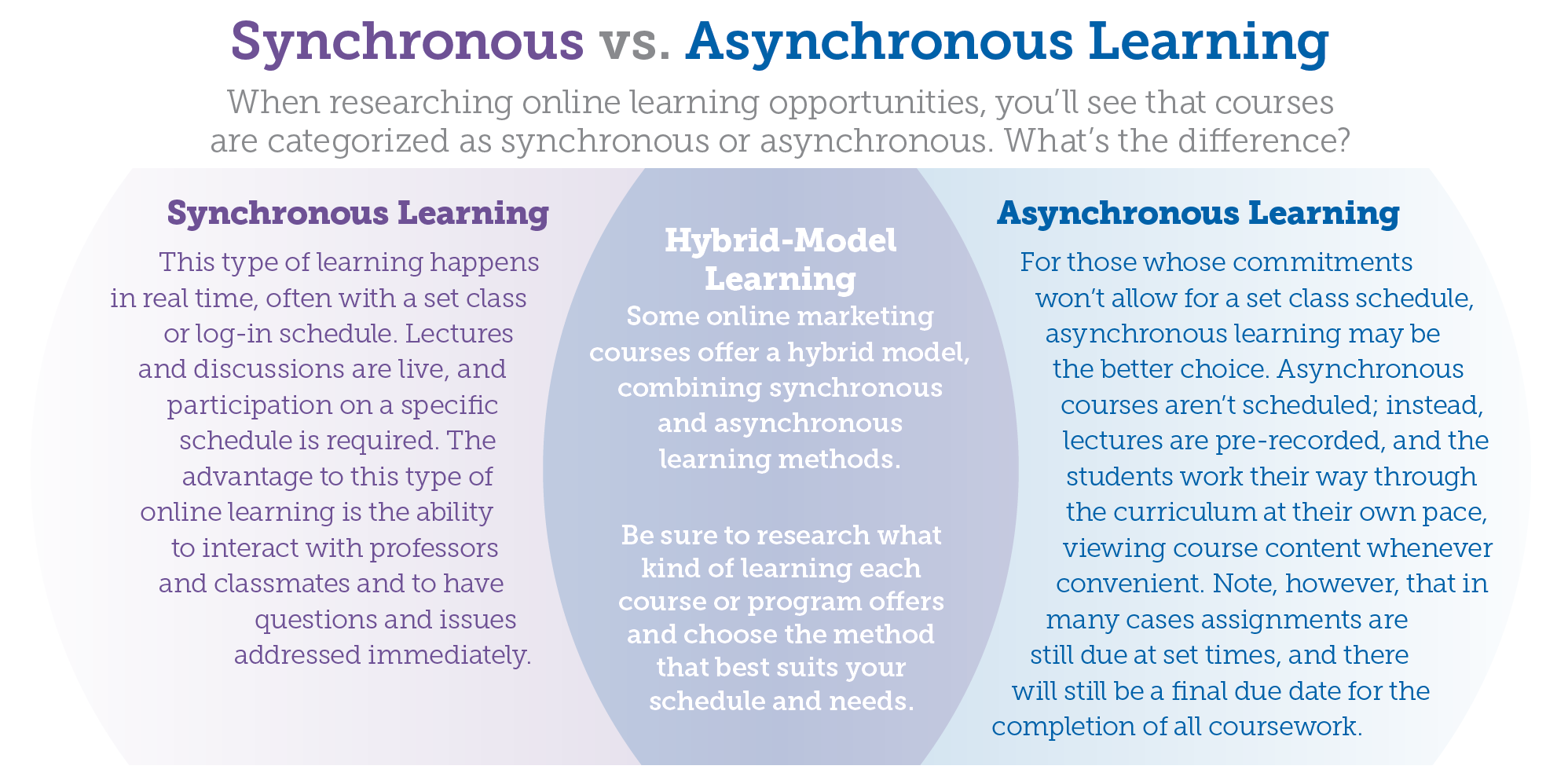S avvy marketers have always engaged in continuing education to stay on top of the latest trends. Today, with the ascendance of digital marketing and evolving technologies, even experienced marketers need additional training to stay ahead of the curve.
As the Talent Acquisition Manager at Lululemon and former North American recruitment consultant for Smart, Savvy + Associates, Maxie Friendly reflects, “The world of digital marketing is ever changing. It is important to stay current, and a certification program is a great way for marketing professionals to do so. This is especially true for leaders who started their careers in a more traditional marketing mix and who need to learn and utilize new technologies.”
Virtual Training in the Workplace
Many workplaces are already on board and ready to invest in employee education. Virtual training powerhouse Udemy recently conducted a survey of over 500 global professionals to identify trends in corporate learning and development programs and found that the primary aim for those programs in 2021 will be to close the skills gap among employees.
In fact, the key takeaway from their 2020 Workplace Learning Trends Report is that upskilling will be of primary importance for many companies in the next year. With technical skills expiring within 18 months on average, according to Udemy, if you are looking for a New Year’s resolution, starting a new online skills program could be just the thing.
Traditionally, those looking for certifications or specific courses in specific areas of marketing, such as lead generation or social media campaigns, would look to online offerings from organizations such as Udemy, HubSpot Academy, Coursera, LinkedIn Learning, or Facebook Blueprint. These courses and trainings have been purpose built for online learning and have tended to focus on digital marketing.
Traditional Educational Institutions Join the Party
However, the pandemic has escalated the move by name-brand colleges and universities to develop online courses in all areas of marketing in addition to digital marketing programs. Whether you’re looking for a course, a certification, or even a degree in any area of marketing, you can now find a match from a college, university, or business school.
As organizations encourage employees to expand their skill sets, there have never been more options for expanding your knowledge base from the comfort of your home. But what’s the difference between a degree and a certification, and where should you look for online marketing course content? Here’s a guide to get you started.
Digital Marketing Certification Programs
“Digital marketing plans and best practices are not one-size-fits-all,” Friendly notes. “Strong digital marketers take time to understand the company’s business needs, then create customized digital marketing plans based on specific goals. Strong digital marketers are a master of this, and it requires a wide range of skills,” she adds. Luckily, today we have the highest number of opportunities for online learning for digital marketers than has ever been seen.
Whether you’re new to the field or just want to brush up on your skills, many colleges and universities offer either certificate or degree programs in digital marketing. The difference between the two has to do with course credits.
The pandemic has escalated the move by name-brand colleges and universities to develop online courses in all areas of marketing in addition to digital marketing programs.
Certificates vs. Degrees
Certificates are awarded for completing a course of study that is done on a non-credit basis. Certificates can be in a specific area within digital marketing (lead generation, for example) or can be awarded for completing a larger study of digital marketing overall.
Degree programs, by contrast, lead to a graduate degree and require a certain number of course credits. Degree programs take longer than certificates and tend to cost more than certificate programs. If you already have a bachelor’s or master’s degree, certificate programs could be the optimal choice for updating your skill set or expanding your knowledge on the latest digital marketing advancements. Accelerated by the ongoing remote learning environment that has washed over educational institutions, many well-known and prestigious schools have begun offering online digital marketing certification programs designed around distance learning.
Duke University, for example, offers a Certificate in Digital Media and Marketing through its Office of Continuing Studies. This is a self-paced program designed for people who want to improve their skills in digital marketing or start a new career in the field. It is one of the most comprehensive noncredit programs, with 350 combined instruction/study hours delivered over 12 months. The course empowers students with the right skills required to be professional digital marketers. The program is delivered through streaming video lessons by top-notch authors, speakers, and consultants. Courses include search engine optimization, content marketing, email marketing, and web analytics.
1 It’s never been easier!
With so many of us at home with extra time to fill, the online flex-participation format offered by even top-tier institutions makes taking an online course more convenient than ever.
2 You’ll gain confidence.
A study by Adobe found that less than half of digital marketers feel confident in their skills, which can affect overall performance and results. Making sure you feel comfortable with SEO, social media strategy, pay-per-click, and analytics ensures you can make informed choices for your organization and course correct based on the resulting data.
3 You will become more valuable.
The demand for online marketers has never been higher. In fact, according to the American Marketing Association, salaries continue to rise for online marketing roles of all kinds as the gap between supply and demand widens.
The Wharton School at the University of Pennsylvania also offers a digital marketing certification program. Their online digital marketing courses teach the key marketing skills most in demand today: omnichannel marketing; marketing analytics; social media strategy and analysis; and data-driven, customer-centric approaches to customer retention. The certificate program consists of four courses that each last six weeks; the courses are also offered individually for those who don’t want to pursue the certificate.
If a certification program is too involved for you, the Kellogg School of Management at Northwestern University offers an MBA-level continuing education course in digital marketing. Digital Marketing Strategies: Data, Automation, AI & Analytics is an eight-week, online program that provides an end-to-end perspective of the modern marketing process, starting with gathering customer insights, moving through content strategies and execution, and culminating in optimization and AI applications.
Rutgers, The State University of New Jersey, offers 11 online marketing degree programs at the undergraduate and graduate levels, including an online Mini-MBA in Digital Marketing and a digital marketing certificate program. The Mini-MBA is a 12-week, self-paced program and includes courses in content marketing, digital marketing, and social selling. Rutgers also offers a variety of online digital marketing courses on an individual basis.
Of course, these are just a few examples of online courses in digital marketing. MIT, Notre Dame, Georgetown University, and Syracuse University also offer certification programs and individual courses online.

Online MBA-Level Courses & MBA Programs
If you are seeking coursework more advanced than that of digital marketing certification programs, many business schools offer online MBA-level marketing courses, and in many cases, you can complete an actual MBA in marketing online. These programs are broader than just digital marketing and include courses in marketing strategy, research and analysis, international marketing, decision-making, and product management. These programs tend to cost more and take more time and effort to complete than certification programs, but they are a great option for those looking to move into management or take their marketing career to the next level.
Cornell University’s eCornell offers a program much like Rutgers’ Mini-MBA, a series of six MBA-level marketing strategy courses designed to help you set strategic direction for your company, department, or product line. Learn to drive results through market research, brand communication, new channel distribution, and more, positioning marketing as a key driver for overall business strategy. Completion of the self-directed curriculum leads to a Marketing Strategy Certificate.
Fordham University’s Gabelli School of Business offers an online Master of Science in Strategic Marketing Communications, an integrated program focused on understanding the complexities of audiences with multifaceted identities, creating meaningful brand engagement, and telling purposeful stories that grab—and keep—your audience’s attention. Courses include crisis communication, corporate communication, and purpose-driven marketing, as well as research methods and social and digital media.
Carnegie Mellon University offers an online MBA in marketing through its Tepper School of Business. The curriculum trains students to use current marketing tools to analyze data and make strategic marketing decisions. The program takes 32 months to complete and includes coursework such as marketing with social media, segmentation, consumer behavior, and marketing research. Students must also complete a capstone project.
One of the highest-rated online marketing MBA programs is offered by Florida International University. The curriculum focuses on essential marketing topics and includes coursework in brand management, e-marketing, marketing analytics, marketing research, and consumer behavior. Students must also complete professional development seminars or an internship. The program takes 10 months
to complete.
Online Nondegree, Noncertification Courses
With today’s overpacked schedules, not everyone has time to work toward a certification or degree. Many colleges and universities offer individual courses online through their continuing education programs, including courses in marketing. Harvard University, for example, offers courses in marketing management, brand strategy, marketing analytics, digital marketing, and international marketing.
If you prefer Harvard’s rival, the Yale School of Management offers an online course called Digital Marketing: A Strategic Perspective, an eight-week course that discusses how social media, SEO, content marketing, mobile technologies, and other key digital marketing tools can be leveraged to create and extract value for your customer.
For those who want something shorter and more digestible than an individual college-level course, online training sites such as Udemy and Coursera offer several specific areas of training for marketers. Although these courses weren’t developed by university or business school professors and don’t contribute toward an accredited certification or degree, for those who need a quick refresher or an introduction to a new skill set, these are great options.
No matter which avenue you pursue, 2021 is a great time to expand your marketing knowledge and skills and to kickstart a new phase of your career.







